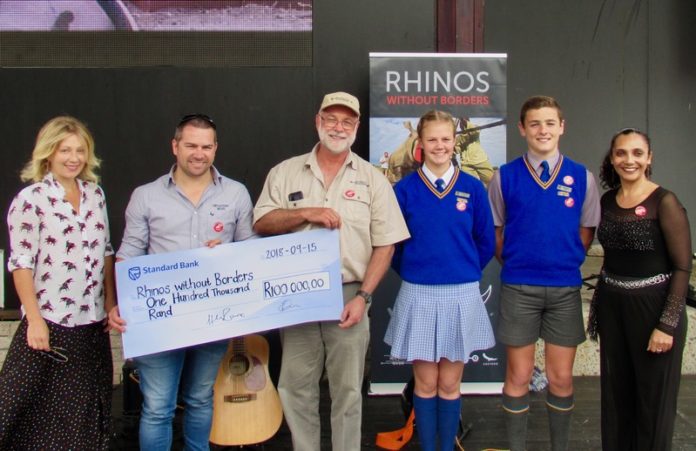
Linton Park Estate near Wellington in the Cape Winelands in South Africa once again raised a substantial amount of R100 000 for rhino conservation in South and Southern Africa.
At a special World Rhino Day celebration event held at the V&A Waterfront Amphitheatre in Cape Town on Saturday, 15 September the estate’s donation was handed to Les Carlisle, the Group Conservation Manager of the AndBeyond Group & Project Manager of Rhinos Without Borders (RWB). This is the 3rd year running that Linton Park supported the RWB campaign for rhino conservation in co-operation with the Wellington Hugo Rust Primary School with their own fundraising drives.
The amount of R282 000 was raised in three years. From a modest beginning in 2016 with a total donation of R55 000, the estate and Hugo Rust Primary jointly raised R282 000 during the three year period from 2016 to 2018. The school’s fundraising for 2018 is still underway and also took place amongst the public at the V&A Waterfront during the World Rhino Day celebrations.
The Estate’s Rhino Involvement Linton Park, with a founder’s history dating back to 1699, is part of the multinational Camellia plc. business group with its head office in London. Camellia bought Linton Park in 1995 and started with an extensive restoration programme reinstating the estate to its former glory and that was completed early in 2017.
Herman le Roux, Linton Park’s Commercial Director, explained the estate’s support for rhino conservation in the folowing words: “At Linton Park, we fully endorse Camellia’s global philosophy of environment and nature conservation wherever possible. In view of the fact that we have a sensitive and threatened ecosystem on the estate that is a distinctively rare South African type of veld – historically and commonly known as ‘Renosterveld’ in Afrikaans – we decided to commit ourselves to conservation on a wider scale and also specifically to saving rhinos as a precious part of South Africa’s unique cultural heritage.”
He elaborated: “It is unfortunate that the continued existence of rhinos on the African continent and in our country is in serious jeopardy and very much under financial pressure. We make our donation to contribute to this special saving rhinos cause. We also want to show our support for the invaluable work that champions such as Les Carlisle, his colleagues, the Rhinos-Without-Borders teams and others do in this regard.”
Hugo Rust Fundraising Initiatives Local Hugo Rust Primary School in Wellington with its 600 pupils have since 2016 joined forces with Linton Park in the fight to save rhinos. Under the inspirational leader- ship of Ronel Saayman, project leader and teacher at Hugo Rust Primary, the school’s learners, teachers and parents raised about R 42 000 during 2016 and 2017 through various imaginative fundraising initiatives. A range of colourful hand-produced rhino icons by the pupils attracted wide public interest and support.
One Rand per bottle for Saving Rhinos Le Roux added that the estate’s donation was made possible by the sales of the Linton Park ’Rhino’ wine range during the previous financial year – highlighting their excellent Rhino Cabernet Sauvignons and. Chardonnays.
Consequently R100 000 was accumulated by one rand per bottle sold for rhino preservation. “Except for the growing sales of our Rhino range in international markets, the South African public also increasingly support us by buying our Rhino wines. Furthermore, the media helped us in raising public awareness and the trade assisted us where possible with listings and distribution. We wish to thank them all for making this donation possible”, he concluded.


